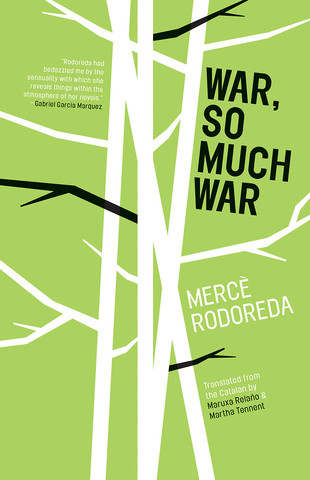
Interfictions, the online journal of the Interstitial Arts Foundation, recently published its sixth issue and it includes a new piece I wrote.
It’s an experimental book review, the third one I’ve done. Part criticism, fiction, and memoir, it’s about all the things a good book shakes loose inside me, which tend to spill out in raw form and later become a short story masquerading as a book review, or vice versa.
The review focuses on Mercè Rodoreda’s new novel, War, So Much War, published in English for the first time by Open Letter Books, translated masterfully from the Catalan by Martha Tennent and Maruxa Relaño, who’ve collaborated on many books together.
Interfictions is a fantastic venue to work for. For one thing, they pay their writers. Which is nice but most of all I’m grateful I got to work with Sofia Samatar, whose editorial guidance made all the difference as this review took shape.
Thanks in advance if you get a chance to read my piece and some of the others at Interfictions–the short stories were chosen by guest editors Carmen Maria Machado and Sam J. Miller. And be sure to check out Rodoreda’s novel! It’s one of my top three books for 2015.
Very interesting approach. But inquiring minds want to know, why is your critic always female?
Seriously though I suspect this approach could be a very helpful exercise in itself. I have only been writing about books in a serious manner, and on my own blog where I am not constrained by outside editorial interference for better or worse, for a year, give or take. I am now starting to contribute to an online journal with longer critical reviews but that demands a perspective that stands discreetly outside, or to the side of the work under assessment.
Over all, the process of reading and writing critically is something I enjoy and that I feel has strengthened my confidence as a writer. But for decades I have faced massive roadblocks crossing confidently into creative fiction or nonfiction that lies closer to home. And there is a story that I feel compelled to tell. I never thought about taking a book that speaks to me personally and using it as a spin off point to kick start, or as you say, shake loose what lies tangled up inside and run that into writing exercises that might unlock the barriers currently standing in the way of my own personal creative writing, if that makes sense.
LikeLiked by 1 person
Thanks for your question, er, comment. :)
Not only is the narrator a woman, but all the books I’ve reviewed thus far have been written by women, translated into English. I intend to keep it that way.
There are several reasons. For me as the writer there’s the benefit of crafting something challenging: it makes me nervous worrying that readers might not find my narrator believable or compelling. That discomfort makes me work harder and, I hope, yields better results. It gives me another layer to navigate as I convey the experience of reading and critiquing the author’s art.
Likewise for the reader, I hope the narrative layer also makes things more interesting as they try to perhaps parse what’s fiction and nonfiction. Or, I hope, just find the prose enjoyable and the story-about-reading-a-story engaging and worthwhile.
Good luck with your future reviews. I enjoyed your recent post about “Memory Theatre” btw; sounds like Critchley’s done something quite unique with that one.
LikeLiked by 1 person
Thanks for taking the time to respond. I was, of course teasing you about the gender, but I can appreciate how taking up the female voice and subject offers both a challenge and the space to explore. For myself, when It comes to creative writing my challenge actually arises directly from the fact that I do not and never will possess a complete and coherent experience from either the male or female perspective. I know what it is like to physically experience childhood, puberty and even childbearing in a female body without ever *feeling* female and being deeply troubled by that fact. For 15 years I have lived, appeared and functioned in the community as a man which *feels* right, but will never physically be whole or coherent. It is exactly that experience of being in between (and I do not mean rejecting the gender binary which is quite the rage these days) that I want to articulate. I cannot imagine a way of achieving that without breaking down the boundaries between memoir, fiction and philosophy. That’s why I am increasingly drawn to substantive experimental writing that blurs the lines.
Thanks for calling my attention to Interfictions, and I look forward to seeing you continue to develop your inventive approach to reviewing.
LikeLiked by 1 person